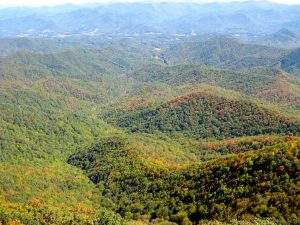 Dr. Charley Kelly, a former lab member and now with the Division of Forestry and Natural Resources, West Virginia University, had a paper accepted in Geophysical Research Letters this week. The study re-examines several paired watershed studies from the Coweeta Hydrologic Lab, but focuses on high flows, low flows, and interactions with precipitation patterns.
Dr. Charley Kelly, a former lab member and now with the Division of Forestry and Natural Resources, West Virginia University, had a paper accepted in Geophysical Research Letters this week. The study re-examines several paired watershed studies from the Coweeta Hydrologic Lab, but focuses on high flows, low flows, and interactions with precipitation patterns.
Abstract: Increases in extreme precipitation events of floods and droughts are expected to occur worldwide. The increase in extreme events will result in changes in streamflow that are expected to affect water availability for human consumption and aquatic ecosystem function. We present an analysis that may greatly improve current streamflow models by quantifying the impact of the interaction between forest management and precipitation. We use daily long-term data from paired watersheds that have undergone forest harvest or species conversion. We find that interactive effects of climate change, represented by changes in observed precipitation trends, and forest management regime, significantly alters expected streamflow most often during extreme events, ranging from a decrease of 59% to an increase of 40% in streamflow, depending upon management. Our results suggest vegetation might be managed to compensate for hydrologic responses due to climate change to help mitigate effects of extreme changes in precipitation.